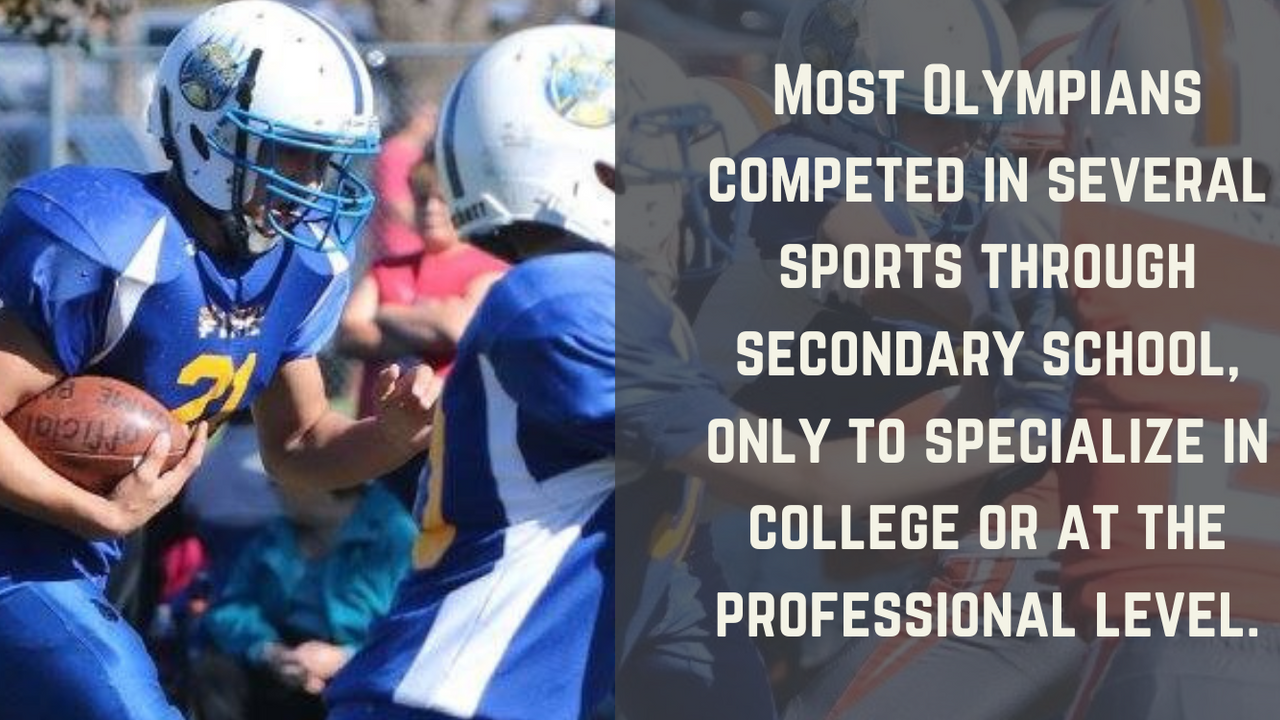
How Do Olympians Prepare
Olympians prepare for successful competition with proper training and strong support system. Olympians use both physical and mental preparation to achieve their goals. The Olympic athletes are successful because they love the challenge and competition, they have a strong desire for success and have fun while training and competing.
Love of sport and activity, early success and the people in their lives (parents, coaches and peers) were the top influencers for the Olympic athletes surveyed.
Study of Olympians
Most Olympians competed in several sports through secondary school, only to specialize in college or at the professional level; in fact, 88% of Olympians surveyed thought participating in multiple sports was an important factor in their journey to the Olympic Games.
Pathway to Excellence: A View on the Athletic Development was a study by the United States Olympic Committee that surveyed Olympians about motivational and influencing factors in their development (Reward & Snyder, 2014).
Early Success and Olympians
Success in the early stages of athletics was also an important factor, however success was not defined by winning or losing but by learning and developing new challenging skills. We can see from the results, as coaches, it is important to provide a challenging and fun competitive environment for athletes.
It takes time and commitment to be successful. The average Olympic athlete starts their sport at 11 years old and it takes 14 years of development to reach the status of Olympian. Most Olympians were multiple sport athletes up until the age of 18 and 88% of the multiple sport athletes believed it was an important factor in their journey. From this we can extrapolate that premature sports specialization is not necessary or ideal.
If it typically, it takes 14 years to reach the highest status in athletics, the Olympian, the principles of deliberate practice will help determined athletes stay focused and motivated.
Multiple Sports and Olympians
It is important for younger athletes to participate in multiple sports to develop overall athletic abilities. As an athlete gains experience and skills in a specific sport, more concentrated training in one event area occurs. After an athlete’s skills are refined to a high level after years of training, further progress can only be made over time using deliberate practice; otherwise progress will likely stagnate.
Studies on Olympians
Pathway to Excellence: A View on the Athletic Development
Development of Olympic Dream
- Introduced to the sport: 11.4 years old
- Achieved local competitive success: 14.2 years old
- First dreamed of becoming an Olympian: 14.0 years old
- Started making decisions to make Olympic dream a reality: 17.5 years old
- Believed it was possible to become an Olympian: 19 years old
- Made first U.S. Olympic Team: 25.5 years old
Why Olympic Athletes Make It
- Intrinsic love of activity
- Love of the sport
- Early success
- Parental influence
- Coach recruitment
- Peer recruitment
- Sibling recruitment
- Encouragement from a physical education teacher
The love of sport and activity, early success and parental/coaching influences were considered the main factors that drove Olympians to success.
Motivational Factors of Olympians
- Challenge/love of competition
- Desire to be successful
- Competitive outlet
- Fun
- Intrinsic value of the sport
- Skill acquisition
- Recognition
Competition, success and fun were the primary factors that motivated the Olympic athletes.
Early Competition and Olympians
- Unstructured play with friends
- Family activity
- Club
- Community based program
- High school athletics
- Parks and recreation
- Elementary school physical education
The overwhelming majority of athletes surveyed selected unstructured play with friends, family activity or club sports are the first involvement in athletics.
Desired Coaching Traits of Olympic Athletes
- Teaching ability
- Ability to motivate or encourage
- Training knowledge
- Strategic knowledge of the sport
Coaching Olympians
Having the knowledge and the ability to effectively communicate that knowledge was very important to the Olympians in the survey. Coaches need to know how to teach the skills to improve performance. Using different teaching strategies and providing feedback will help the athlete improve performance and gain a broader knowledge base about the sport
In addition, the ability to motivate athletes during the training process was viewed as an important quality in coaches. Motivation is influenced by many factors and not every athlete is motivated the same way. Motivation relates to actions that will result in an achievement, behavior or performance.
Athletes are often motivated during training because they understand proper practice will lead to better performance and high achievement.






